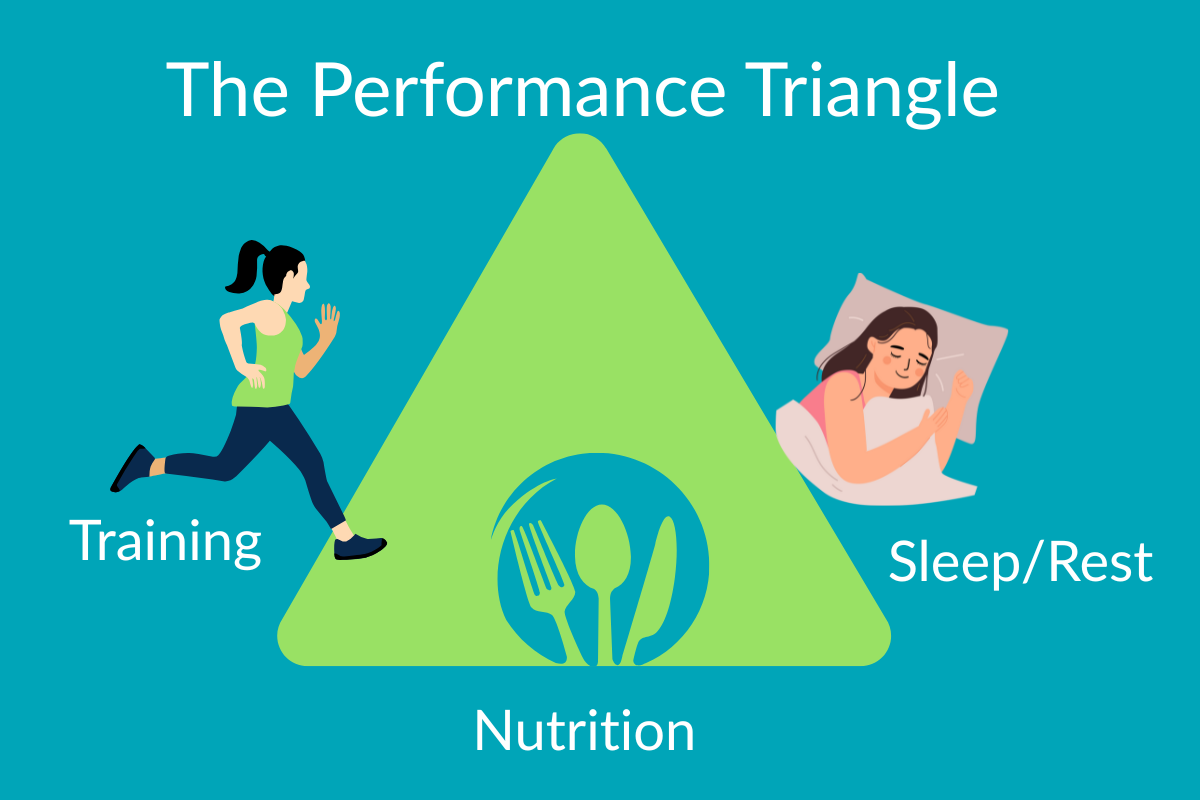I love the concept of The Performance Triangle as it It helps me see that running performance isn’t about pushing harder in just one area, but about balancing all three sides of the triangle equally. It provides a manageable, balanced approach that supports not just your running, but your whole life.
🔺When to check in on the Performance Triangle
Sometimes our training hits a plateau, or we’re aiming for that next-level distance or a big event. We push harder, log more miles, and fine-tune our workouts, but despite all the effort, progress stalls. Maybe you feel unusually tired, your recovery is slow, or those niggling aches just won’t go away.
You might find yourself reaching for sugary snacks after restless nights, or struggling to stay motivated even though your training volume is high.
These are subtle signals that something in your Performance Triangle, your balance of Training, Nutrition, and Sleep, might be out of sync.
Checking in on these three pillars can reveal what’s holding you back and how to bring them back into harmony. When all sides of the triangle are balanced, your running, recovery, and overall wellbeing improve, unlocking your true potential.
Most runners prioritise training, then nutrition, with sleep often last on the list. But sleep is a vital cornerstone of your health and performance. Skipping out on it can cause a ripple effect of problems.
🏃 Training & Sleep: A Delicate Dance
Moderate exercise usually improves sleep quality.
But training too close to bedtime or at high intensity may disrupt sleep for some.
Afternoon workouts tend to promote relaxation and better sleep.
Everyone reacts differently — observe how your training time affects your sleep.
Beware of Overtraining
Pushing beyond recovery can cause overreaching or overtraining syndrome, marked by fatigue, injury risk, and poor sleep. Sleep is your body’s best recovery tool; don’t shortchange it.
😴 Why Poor Sleep Can Wreck Your Running
Poor quality sleep can:
Impair your glycogen stores — your running fuel
Decrease muscle repair and strength
Increase injury risk
Slow reaction times and decision-making
🥗 Nutrition & Sleep: The Vicious Cycle
Poor sleep leads to cravings for high-carb comfort foods → weight gain → reduced performance.
But poor diet also disrupts sleep, creating a vicious cycle of fatigue and poor choices.
Hormones like cortisol, melatonin, and insulin get out of balance, breaking down muscle, increasing inflammation, and impairing recovery.
Watch These Sleep Disruptors:
Caffeine
❌ Delays sleep onset and reduces sleep quality
✅ Tip: Cut off caffeine intake by midday. Try green tea or decaf if needed.
Alcohol
❌ Reduces both the quantity and quality of sleep, causing night awakenings
✅ Tip: Limit or avoid alcohol near bedtime.
Late big meals
❌ Digestion can interfere with sleep quality
✅ Tip: Finish your main meal at least 3 hours before bedtime.
High sugar foods
❌ Cause spikes in insulin and cortisol, which can lead to insomnia
✅ Tip: Choose balanced meals with steady energy release.
Going to bed hungry
❌ Triggers stress hormone (cortisol) release, disrupting sleep
✅ Tip: Have a light, balanced snack if needed before bed.
⚖️ How to Bring Your Performance Triangle Back into Balance
Small changes can have a big impact! Try these:
⚖️ How to Bring Your Performance Triangle Back into Balance
🛏️ Prioritising Better Sleep Habits
Small changes can make a big difference when it comes to balancing training, sleep, and nutrition. For sleep, try getting to bed at least an hour earlier and aim to finish work or chores by 8 pm. Power off screens at least an hour before bedtime to avoid blue light disrupting your melatonin, and create a relaxing pre-sleep routine - whether it’s listening to soothing music, having a warm bath, or reading a book. You might also consider “sleep banking,” where you extend your sleep ahead of busy days or races to help maintain performance.
🥗 Supporting Sleep Through Nutrition
Nutrition plays a key role too. Stop caffeine intake after midday and swap to green tea or decaf if you need a warm drink later on. A sleep-friendly snack like cherries or kiwi paired with Greek yogurt can promote restful sleep, while eating your main meal at least three hours before bedtime gives your body time to digest. Boost your intake of magnesium-rich foods such as leafy greens, nuts, and dark chocolate, and optimise your protein intake to support muscle repair and melatonin production. Discover the EAT TO RUN approach in my book.
🏃 Training Smart to Enhance Recovery
Finally, when it comes to training, schedule rest days or reduce intensity as needed - this is crucial. Reflect on your goals, because sometimes less training can actually help you perform better. Also, consider the timing of your workouts: evening exercise may delay melatonin release, while morning or early afternoon sessions can advance it, helping you fall asleep earlier. Listen closely to your body and adjust your routine to find what works best for you.
🤔 What’s Your Performance Triangle Look Like?
Ask yourself:
Is your training impacting your sleep and diet?
Are your food choices hurting your sleep?
Is poor sleep driving bad nutrition and poor recovery?
Reflect on which side feels out of balance, then tackle that area first. You’ll be surprised how much better your running and life can feel when your triangle is aligned.
🔑 Key Takeaways
The Performance Triangle = Training, Nutrition, Sleep/Rest — all equally important.
Most runners focus on training, but ignoring sleep or nutrition can backfire.
Food and drink choices have a powerful impact on sleep and performance.
Poor sleep often leads to poor food choices - vicious cycle alert!
Improving one side helps balance the whole triangle.
Everyone is different - reflect and adjust what’s best for YOU.
💬 What side of your Performance Triangle needs attention? Hit reply and let me know! I’d love to hear how you’re balancing training, sleep, and nutrition.



